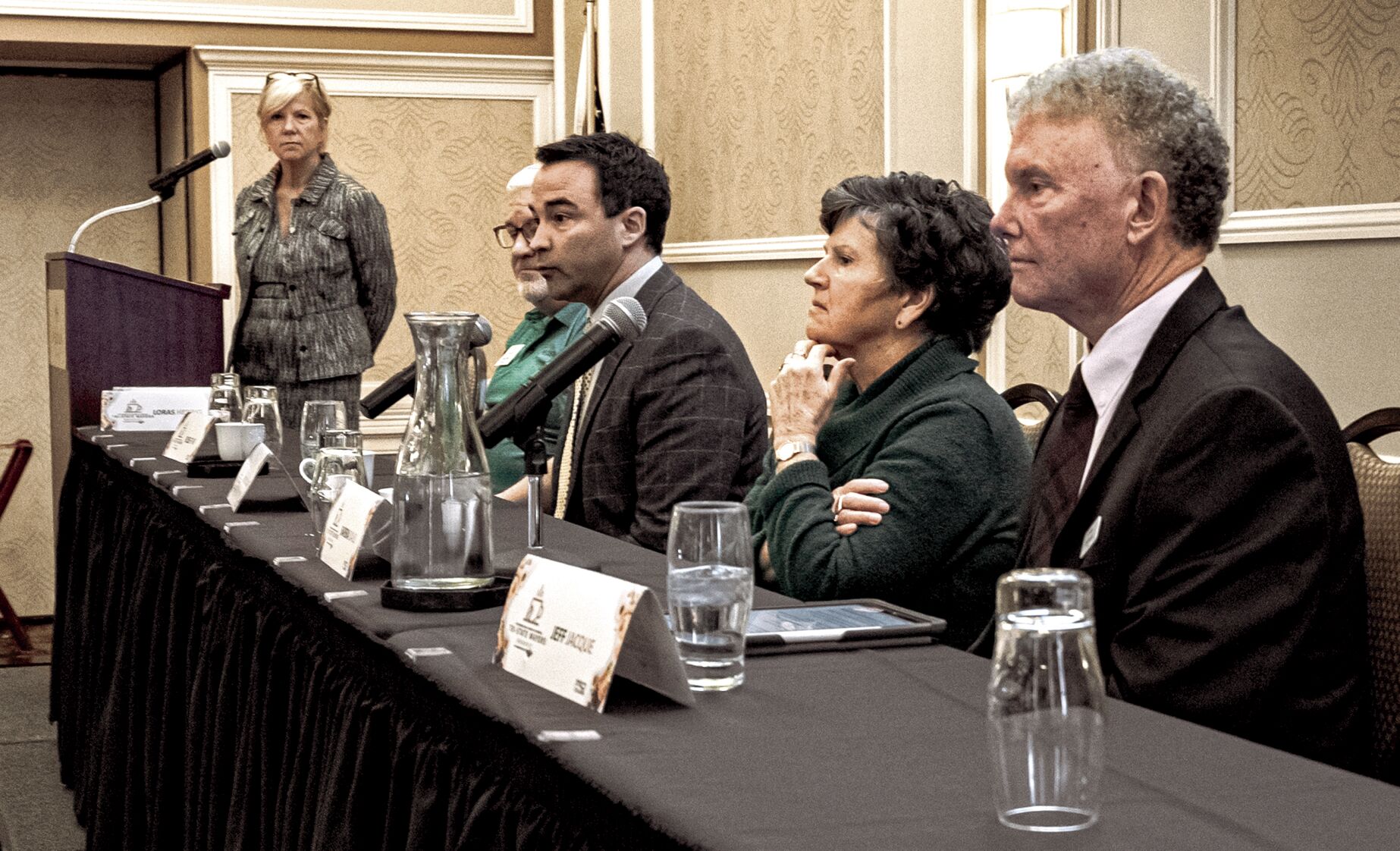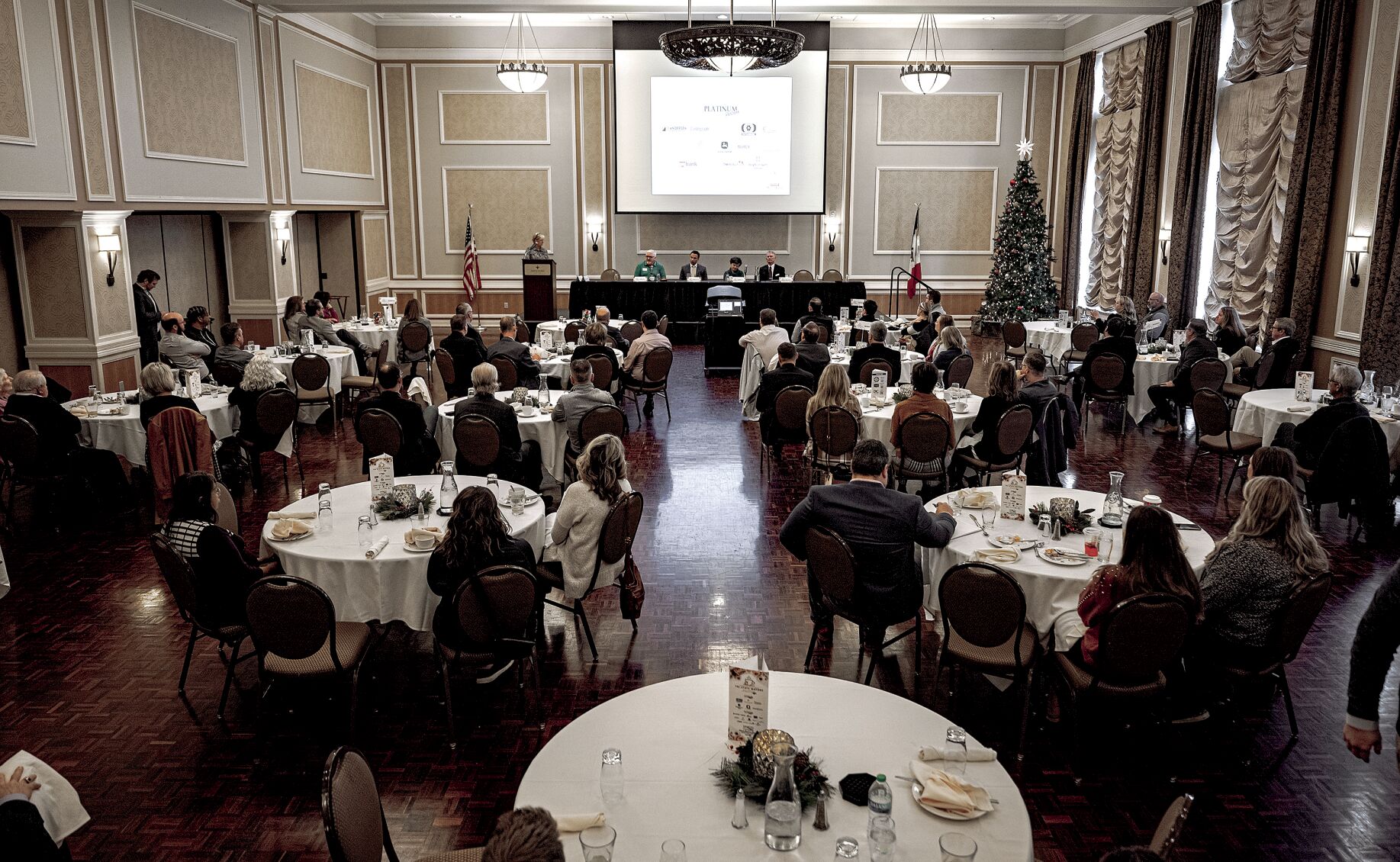Area city and business leaders gathered Friday morning to discuss a top priority: finding ways to recruit more workers to the region and retain those residents already here.
The Tri-State Mayors Breakfast at Hotel Julien Dubuque featured Dubuque Mayor Brad Cavanagh; Peosta, Iowa, Mayor Russ Pfab; Dyersville, Iowa, Mayor Jeff Jacque; and Platteville, Wis., Common Council President Barbara Daus. It was hosted by Dubuque Area Chamber of Commerce in partnership with Dyersville Area Chamber of Commerce.
The Dubuque chamber also released its 2023 local legislative agenda at the event — supporting small businesses with grant programs, establishing property tax rates promoting economic growth and attracting and retaining workforce.
“It will surprise nobody that workforce remains a top concern for employers,” said Molly Grover, the chamber’s president and CEO. “Housing, transportation and child care are our top priorities in this regard as we work to grow the regional economy. Those barriers are really significant, and we know you are all feeling them.”
All of the area leaders speaking at the event cited ways they hope to address workforce-related challenges in the future.
“One of the things I think is when workforce issues first started during the (COVID-19) pandemic, I think people were looking for a really quick fix,” Cavanagh said. “People saw unemployment as an issue, and the state slashed unemployment benefits, and we still saw a similar problem. What we recognized over the course of the last couple of years, it’s a very multifaceted issue and backed by things happening before the pandemic began.”
He cited housing as a top priority for the City of Dubuque, pointing to new housing incentives created this fall aimed at making housing developments more financially feasible.
“We’re seeing housing developers approach the city, and we’re seeing more housing popping up,” Cavanagh said. “I’m confident we’re going to start to see some real inroads on this issue. The gap in the middle of workforce housing needs to close.”
Pfab also spoke of apartment buildings going up in Peosta along U.S. 20.
“Hopefully, that will allow more people to live in Peosta that work in Peosta,” he said. “It can be kind of a steppingstone for them — the people that want to be part of Peosta but can’t necessarily afford houses that are available.”
Jacque pointed to Dyersville’s thriving industrial parks as a draw for employees, as well as city amenities that have been worked on or planned for in the past year. The major focus has been development at Field of Dreams, where a $55 permanent stadium and $80 million worth of other development are in the works.
“It not only will bring economic opportunities to Dyersville but the whole tri-state area,” Jacque said.
Daus spoke about Platteville’s proposal to create a child care center at which employers would be able to pre-purchase spots for their employees as a way of encouraging people to work for a business. She said the project was submitted for a state Neighborhood Investment Grant but did not receive the funds.
“I believe we will continue to push that and continue to get the funding to make that happen,” she said. “We just need the capital for the facility.”
The area leaders also discussed getting local college students to stay in the area after graduation. Cavanagh, previously an associate professor at Loras College, said many of Dubuque’s college students are not from the area and can be unfamiliar with the city’s offerings.
“A lot of students don’t get off campus very often,” he said. “I think we need to get better at that, and that’s something we need to continue to address.”
Pfab pointed to the new College Suites apartments in Peosta, which are meant for Northeast Iowa Community College students.
“Now, they don’t have to just drive to campus and drive back home,” he said. “They can stay at an apartment building right on campus, and it gives them ownership of Peosta. They can live here and work here, and I believe that will make them want to stay here.”
Daus added that the area must highlight all of its career opportunities for recent graduates.
“Research has shown some of the reasons students leave the area is because they don’t see a career path here,” she said. “… I think trying to figure out how we come together and show career progression, career paths in the region, it would be a benefit to us all. Kids are going back to Chicago because they see a wide range of opportunities. Here, I think we need to think of how we can show there is a wide range of opportunities if you stay in this region.”



